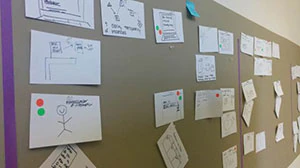Building a Design-Minded and More Collaborative OFA
Executive Summary
 The Administration for Children and Families’ Office of Family Assistance provides $235 million in discretionary grants annually to improve the lives of low-income families by promoting economic self-sufficiency, responsible fatherhood, healthy marriages and family strengthening. Several issues arise with monitoring awarded grants:
The Administration for Children and Families’ Office of Family Assistance provides $235 million in discretionary grants annually to improve the lives of low-income families by promoting economic self-sufficiency, responsible fatherhood, healthy marriages and family strengthening. Several issues arise with monitoring awarded grants:
- Service delivery does not always align with the day-to-day realities and challenges faced by low-income individuals and families, interfering with clients’ abilities to access and benefit from the programs grantees provide;
- Grantees may not have the staff, time, or expertise to conduct analyses and/or develop solutions to address these barriers;
- Due to the private nature of communication channels like email and telephone, lessons-learned are not easily shared with other grantees or grant managers;
- Since grantees and grant managers are geographically distributed, they rarely get to meet face-to-face. This can hinder their chance to build relationships with and count on one another for workplace support.
To address these issues, ACF sought to apply approaches such as design thinking strategies and collaboration best practices to create low-cost, replicable approaches to assess client problems, modernize interactions with grantees, facilitate better knowledge sharing, and build a stronger support network for grantees.
A project supported by the: HHS Entrepreneur-in-Residence Program
Team Members
Entrepreneur-in-Residence
Jared Goralnick
Internal Team
Kathleen Chiarantona, ACF
Blair Corcoran, ACF
Stan Koustaal, ACF
Amelia Popham, ACF
Keyon Smith, ACF
Milestones
September 2013: Entrepreneur-in-Residence Project begins


